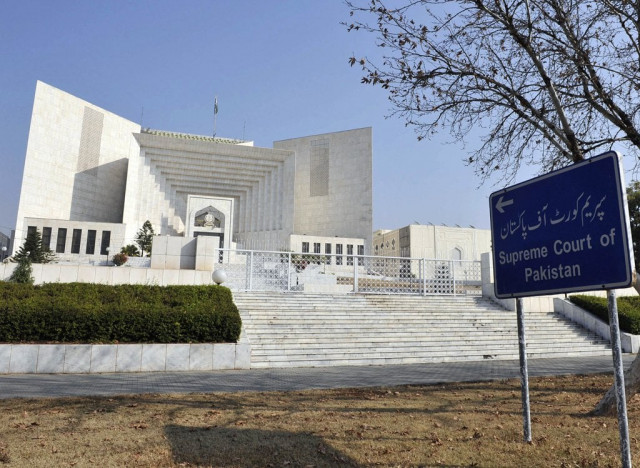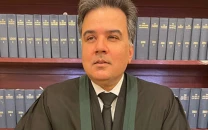Constitution guarantees freedom to profess faith of choice: SC
Ruling says says citizens are equal before law and entitled to equal protection regardless of religion

The Supreme Court of Pakistan. PHOTO: AFP
“Citizens regardless of religion are equal before the law and entitled to equal protection thereof and it is so guaranteed under the Constitution,” said the seven-page written order –authored by Justice Qazi Muhammad Amin Ahmed – acquitting a blasphemy accused after 19-year imprisonment.
The order said the Constitution of the Islamic Republic of Pakistan, 1973 guarantees freedom to an individual to hold and profess the faith of his choice; “in his divine pursuits, he is sovereign and there is no intermediary between his soul and its Comforter”.
“Therefore, the appellant’s [accused Wajeeh-ul-Hassan] declaration of faith [that he is a faithful Muslim] is to be preferred over divergent imputations,” the order added.
A sessions court had sentenced Hassan to death for offences under Sections 295-A, 295-C & 298-A of the Pakistan Penal Code, 1860 in July 2002. A high court in September 2010 had retained the penalty.
The convict later appealed in the Supreme Court which granted leave to his plea in 2013. After the passage of six years, the court resumed hearing of the case.
The order said a criminal charge is to be essentially settled on positive proof alone and not on perceptional or optical paradigms. “The same is required in the present case; nonetheless, [such positive proof is] hopelessly out of sight.”
The court noted that it would be grievously unsafe to maintain conviction without the potential risk of error
“Therefore, by extending the benefit of the doubt, the criminal appeal is allowed; the impugned judgment is set aside; the appellant is acquitted of the charges and shall be released forthwith, if not required in any other case. The office shall ensure destruction of entire derogatory material and copies thereof, at all tiers”
The complainant, Ismail Qureshi, had received a series of letters containing blasphemous content. In one such letter, the alleged sender had established his identity by attaching a copy of the National Identity card of the accused Wajeeh-ul-Hassan, who was later arrested.
The court wondered why Wajeeh who consistently hid over a long period of time, finally dispatched a copy of his ID so as to voluntarily rope himself in a case that might well cost him his neck.
“There appears no earthly reason for his choice; if at all, it is assumed that he was on a suicidal course, he could have simply mentioned his identity in the letters or could come forward, as according to the prosecution, he presented himself on 21-5-2001,” it noted.
The order said it is well settled that a weak piece of evidence cannot corroborate another weak piece of evidence. “Absconsion cannot be viewed as proof of the crime. People stay away from the law for a variety of reasons not necessarily compatible with the hypothesis of guilt; to avoid the impending wrath of opponents in hostile environments, more often than not compel even the innocent into recusal of safety”
The court said it cannot dismiss the appellant’s plea of being a faithful Muslim nor can possibly take exception, in the absence of evidence to the contrary to his acclaimed unflinching conviction in the injunctions of his faith.



















COMMENTS
Comments are moderated and generally will be posted if they are on-topic and not abusive.
For more information, please see our Comments FAQ